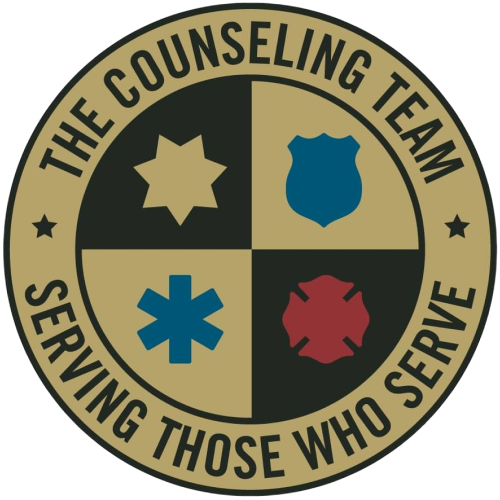A first responder’s work can be rewarding, but over time, it can also take its toll on an individual and lead to emotional exhaustion. This exhaustion can result from high emotional involvement, such as working with traumatized individuals in the community without adequate support. In the emergency services community, compassion fatigue can often be thought of as the emotional exhaustion manifesting itself as the reduced ability of a responder to engage with empathy or compassion toward the person they are helping. It is the strain and burden associated with prolonged exposure of feeling another’s pain or suffering.
Compassion fatigue is made up of two components: secondary trauma and job burnout. These two can overlap as they are both characterized by the emotionally exhausting nature of the work of first responders. However, they are not the same, and each should be treated as having a unique effect on the individual’s well-being. When someone experiences burnout, they may be feeling overwhelmed, exhausted, and that nothing they do will help make it better. Secondary trauma consists of feeling like the trauma of the people they are helping is happening to them or their loved ones. When this goes on for a long time, it can develop into vicarious trauma. These are features of compassion fatigue that are both related to and independent of one another.
Signs and Symptoms
Recognizing warning signs in order to seek help and intervention is essential. Compassion fatigue can adversely affect an individual’s personal, professional, and social functioning and can lead to psychological health concerns such as post-traumatic stress, depression, anxiety, and substance use disorders. According to the Substance Abuse and Mental Health Services Administration (SAMHSA), the following are signs that you or a loved one may be experiencing compassion fatigue:
Emotional Symptoms
- Feeling helpless, overwhelmed, or hopeless when witnessing or hearing of other’s suffering
- Feelings of irritability, sadness, anger, and anxiety
- Feeling detached from your surroundings or from your physical or emotional experience
- Feeling emotionally, physically, or psychologically exhausted, burnt out or numb
- Reduced empathy
- Feeling insensitive or hypersensitive to emotional stories or material you might hear or see
- Decreased tolerance for stress
Cognitive Symptoms
- Constant dwelling on or thinking about the suffering of the trauma survivors
- Constant self-blame or thoughts of “I could have done more”
- Reduced sense of occupational or personal accomplishment
- Difficulty focusing, concentrating or making decisions
Physical Symptoms
- Nausea, headaches, dizziness
- Difficulty sleeping and having nightmares
- Being tense, on edge, and agitated
Behavioral Symptoms
- Withdrawal and self-isolation
- Poor coping skills such as self-medicating and an increase in substance use
- Relationship conflict
- Feeling less efficient or productive at work
- Reduced pleasure in activities you used to enjoy
- Reduced work satisfaction.
While first responders primarily focus on helping others, it is vital that they are also aware and mindful of any psychological changes and emotions they may be experiencing. When helping others, it is essential to check in on yourself and meet your own mental health needs. Witnessing traumatic events can potentially wear you down over time and make you more vulnerable to feeling the traumatic stress, anger, and sorrow of the people you help. To combat this, regularly implementing physical self-care and emotional self-care practices can help prevent or cope with compassion fatigue.
How to Cope
You can counteract compassion fatigue by eating healthy, getting regular exercise, having adequate rest and time off, setting emotional boundaries, practicing mindfulness, and communicating with social support. Other tips include:
- Taking time to appreciate yourself, your hard work, and positives things (you can have visual reminders such as pictures)
- Set realistic expectations, focus on what you have control over, and realize you won’t have full control over most outcomes
- Schedule meaningful activities outside of work, such as a hobby with a loved one, incorporating meditation, yoga, or time in nature into your routine
- Keep a sense of humor
- Focus on balancing work and your personal life
- Set healthy emotional boundaries to maintain compassion and empathy without overly taking on someone else’s pain or tragedy
Another protective tool against compassion fatigue is compassion satisfaction. This refers to a sense of fulfillment individuals feel for their work when helping others through a traumatic experience. Focusing on positive things and knowing that what you do truly makes a difference can be a source of hope and resilience. Even when things do not go how you planned or hoped, appreciating each encounter, knowing you took action to the best of your ability, and extending your help to others can improve your compassion satisfaction.
Paying attention to the signs and symptoms of compassion fatigue can help you identify if it were to arise in yourself or a loved one. Being more mindful of how your job may be affecting your emotional state can ultimately lead to prevention, resiliency, recovery, and reduce its risks among first responders. Bearing the weight of somebody else’s pain every day on the job can become overwhelming and exhausting. It can cause secondary trauma and burnout, which are both components of compassion fatigue. Implementing healthy self-care practices, mindfulness, and improving compassion satisfaction can all combat such emotional exhaustion. At First Responder Wellness, we provide trusted and effective care exclusively to public safety. We understand the mental health strain that can manifest from putting yourself on the frontline with repeated exposure to traumatic situations, and we are here to help. If you can identify with any of the signs and symptoms of compassion fatigue, call us at (888) 743-0490.

